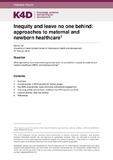| dc.contributor.author | Tull, Kerina | |
| dc.coverage.spatial | Bangladesh | en |
| dc.coverage.spatial | Malawi | en |
| dc.coverage.spatial | Zimbabwe | en |
| dc.coverage.spatial | DRC | en |
| dc.coverage.spatial | Pakistan | en |
| dc.coverage.spatial | Liberia | en |
| dc.coverage.spatial | Sierra Leone | en |
| dc.coverage.spatial | Tanzania | en |
| dc.coverage.spatial | Uganda | en |
| dc.date.accessioned | 2019-03-14T10:52:33Z | |
| dc.date.available | 2019-03-14T10:52:33Z | |
| dc.date.issued | 2019-02-27 | |
| dc.identifier.citation | Tull, K. (2019). Inequity and leave no one behind: approaches to maternal and newborn healthcare. K4D Helpdesk Report 556. Brighton, UK: Institute of Development Studies | en |
| dc.identifier.uri | https://opendocs.ids.ac.uk/opendocs/handle/20.500.12413/14408 | |
| dc.description.abstract | Several approaches have been tried to genuinely leave no one behind in access to maternal and newborn health care (MNH) and the related Reproductive Health (RH) services. Successful ones include individual governmental maternal health programmes, as well as global large-scale approaches and multi-sector programmes. Access to maternal health can be explored through the availability, affordability, acceptability, and/or quality of the services (Levesque et al., 2013; Dalinjong et al., 2018). Evidence shows that the numbers and types of indicators used to assess this varied. Key indicators include increasing assistance of midwifes or skilled birth attendants (SBAs), and attending four or more antenatal visits, which are part of the Sustainable Development Goal targets for 2030. The focus in this review is on DFID priority countries with evidence of high maternal or newborn mortality. However, successful MNH approaches used in other countries are also included, where appropriate. | en |
| dc.language.iso | en | en |
| dc.publisher | IDS | en |
| dc.relation.ispartofseries | K4D Helpdesk Report;556 | |
| dc.rights.uri | https://www.nationalarchives.gov.uk/doc/open-government-licence/version/3/ | en |
| dc.subject | Children and Youth | en |
| dc.subject | Health | en |
| dc.subject | Rights | en |
| dc.title | Inequity and Leave No One Behind: Approaches to Maternal and Newborn Healthcare | en |
| dc.type | Helpdesk | en |
| dc.rights.holder | © DFID - Crown copyright 2019 | en |
| dcterms.dateAccepted | 2019-02-27 | |
| rioxxterms.funder | Department for International Development, UK Government | en |
| rioxxterms.identifier.project | K4D | en |
| rioxxterms.version | VoR | en |
| rioxxterms.funder.project | 238a9fa4-fe4a-4380-996b-995f33607ba0 | en |

